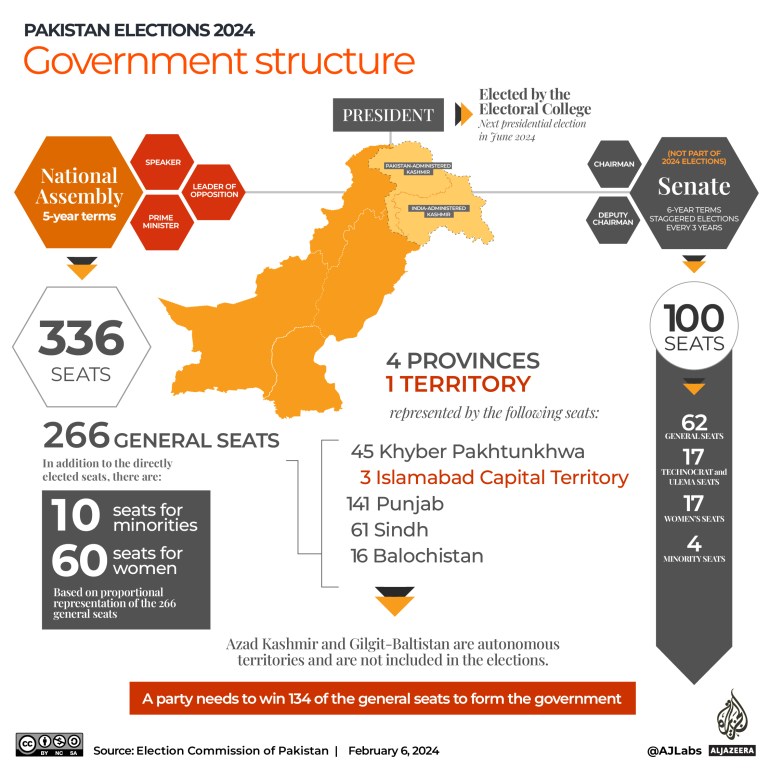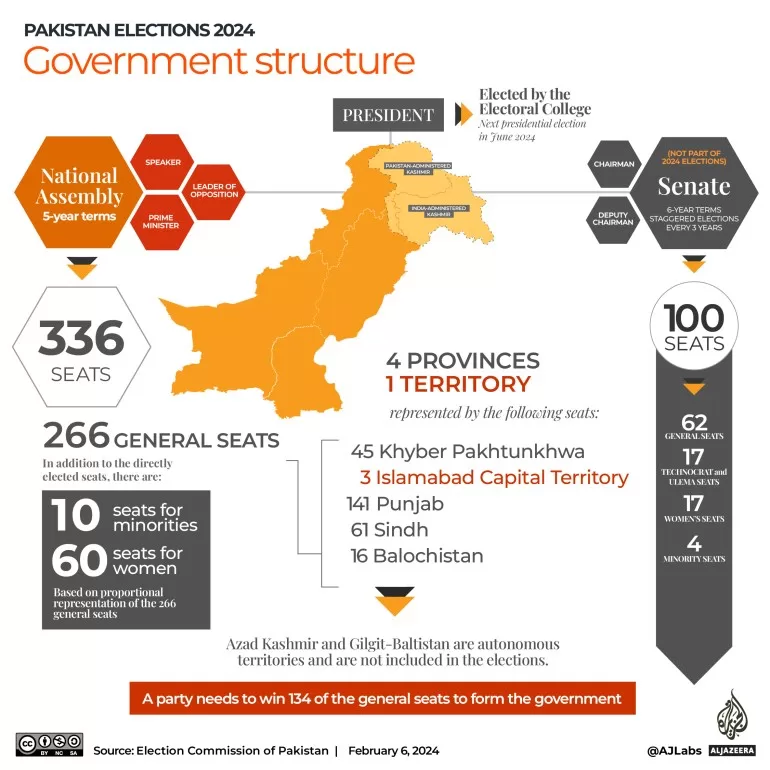That will be the big question as the country’s parliament convenes on Thursday for the first time after the controversial February 8 national elections, marred by large-scale allegations of rigging and manipulation of results.
The tense election threw a split verdict, with independent candidates backed by the jailed former Prime Minister Imran Khan’s Pakistan Tehreek-e-Insaf (PTI) party winning 93 seats, followed by three-time PM Nawaz Sharif’s Pakistan Muslim League-Nawaz (PMLN) securing 75, and Pakistan People’s Party (PPP) 54.
The PMLN and the PPP are in a coalition to form the government, with one of the PTI-backed legislators also joining Sharif’s party.
In the run-up to the vote, the PTI was stripped of its election symbol by the Election Commission of Pakistan for violating election laws, forcing its candidates to run as independents.
Deadlock over nominated members
The meeting of the National Assembly, the lower house of Pakistan’s parliament, is being called on the last day of a three-week window during which a session of the house must be convened to begin the process of government formation.
In the 336-member National Assembly, 266 members are directly elected and 70 are nominated – 60 seats reserved for women and 10 for representatives of religious minorities. The nominations are based on the performance of each political party in the election.
A political party or alliance needs 169 seats in the National Assembly to assume power.

To secure their share of reserved seats, 89 of the remaining 92 PTI-backed parliamentarians joined the Sunni Ittehad Council (SIC), a small religious party. But the ECP is yet to decide on at least 10 reserved seats claimed by the SIC.
Meanwhile, the PMLN-PPP alliance has named Nawaz Sharif’s younger brother Shehbaz Sharif as its prime ministerial candidate. Shehbaz served as premier for 16 months after Khan lost a parliamentary vote of confidence in 2022.
Backed by four smaller parties and some independents, the alliance claims more than 150 seats in the National Assembly.
The SIC group on the other hand has picked PTI leader Omar Ayub Khan as its nominee for the 23rd prime minister of Pakistan.
In the Muslim-majority republic’s 77-year history where the military enjoys immense political clout, no prime minister has completed their five-year tenure.
Nevertheless, here is a look at the two politicians vying to become Pakistan’s next prime minister.
Shehbaz Sharif
Given the numbers, Shehbaz, 72, is widely expected to be elected prime minister.
He earned his reputation as an efficient administrator during his three stints as the chief minister of Punjab, the country’s most populous province whose leadership is often considered a stepping stone to federal power.
Shehbaz came out of his elder brother Nawaz’s shadow in 2018 after the three-time PM was convicted of corruption days before the 2018 polls won by Khan’s PTI. Shehbaz took the PMLN’s leadership in parliament and became the leader of the opposition.
In 2022, Shehbaz, aided by his allies and supported by the military, allegedly orchestrated the downfall of Khan’s government to succeed him as PM. Ironically, Khan himself was said to be propped up by the military in the 2018 election.
![PMLN leader Shehbaz Sharif is nominated by the coalition parties to be the next prime minister of Pakistan. [Rahat Dar/EPA]](https://www.aljazeera.com/wp-content/uploads/2024/02/12022712-1707919172.jpg?w=770&resize=770%2C587)
Sharif’s brief tenure as premier was turbulent as Pakistan lurched from one crisis to another, including the historic floods of 2022. Declared “biblical in proportion”, the deluge submerged nearly one-third of the nation, killing close to 1,800 people and displacing millions from their homes.
The estimated $30bn damages caused by the floods worsened Pakistan’s fledgling economy, bringing it to the verge of default. An economic meltdown was prevented after Sharif succeeded in getting a $3bn bailout package from the International Monetary Fund (IMF). The IMF deal is set to expire next month, with the observers saying Shehbaz’s biggest challenge – if he becomes the PM – would be to stabilise the economy.
Lahore-based analyst Salman Ghani, who has followed the PMLN for decades, says the only way Shehbaz can succeed is by ending political bitterness and extending an olive branch to the opposition.
“If we need stability in the country and continued democracy, his first speech should show a conciliatory approach towards the opposition,” he told Al Jazeera.
“If he is sincere about the economy, then he must display the ability to talk to the opposition. Secondly, the entire political leadership of the country should also find a way to sit together, because otherwise there is always a vacuum which allows unelected forces to take advantage.”
Omar Ayub Khan
Omar Ayub Khan belongs to a political family and has served as a federal minister under different governments.
Omar’s grandfather Ayub Khan was Pakistan’s first military dictator who ruled the country with an iron first for over a decade from 1958 to 1969. His father Gohar Ayub Khan, who also served in the army, joined the PMLN upon retirement and became the speaker of the National Assembly in 1990.
Omar himself was a member of the PMLN before joining the PTI in 2018.
![Omar Ayub Khan (right) is the a former federal minister with the Pakistan Tehreek-e-Insaf who is nominated as party's prime minister candidate. [Sohail Shahzad/EPA]](https://www.aljazeera.com/wp-content/uploads/2024/02/Omar-Ayub-with-Gohar-Sohail-Shahzad-1709121186.jpg?w=770&resize=770%2C512)
After the PTI lost power in 2022, Omar along with hundreds of his party members faced a massive state crackdown. A series of cases were filed against him and other PTI leaders, forcing him to go into hiding.
The crackdown forced many PTI leaders to quit the party but Omar stayed on and was soon appointed the party’s general secretary. His perseverance in the face of adversity, according to some commentators, is the reason why Omar was nominated as his bloc’s candidate for the premiership.
Majid Nizami, another analyst based in Lahore, said Omar’s nomination came due to his opposition to the “establishment” – a euphemism for the military.
“In the history of half a century of his family’s politics, Omar Ayub is the first person to take such an express anti-establishment stance, when he himself and his family were considered staunchly pro-establishment in the past,” Nizami told Al Jazeera.
Nizami added that if Omar fails to become the PM, he could still emerge as a strong leader of the opposition and may give Shehbaz’s government a tough challenge.
“It appears unlikely he will become the prime minister, but his service for the party meant he was rewarded with the position and his experience,” he said.
